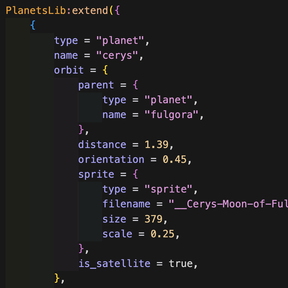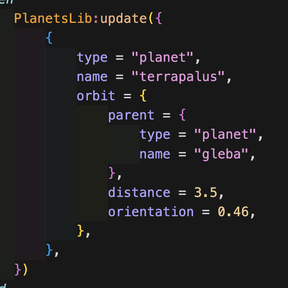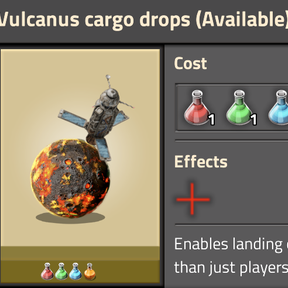PlanetsLib
Code and graphics to help modders creating planets, moons and other systems. This library is a community project and will grow over time. Anyone is welcome to open a pull request on Github. For feature requests, please open an issue. For general discussion, use Discord.
Since other mods make use of the 'orbit structure' this mod provides to the solar system, it is recommended to add PlanetsLib compatibility to your planet mod either by defining your planet prototype using PlanetsLib (as in the first image in the mod portal gallery), or by calling PlanetsLib:update in data-updates.lua (second image in the gallery). Besides improving compatibility with PlanetsLib consumers, this means if another mod updates the position of your planet's orbital parent without moving your planet, your planet will be moved too.
We aim to never make any breaking API changes such that the library is safe to use. We sometimes deprecate APIs by removing them from the documentation, but they stay functional.
Player-facing features
The primary intent of PlanetsLib is to be a library which provides opt-in functionality for other mods. However, a small number of game-affecting or player-interface-affecting features have been added over time. These are listed below, player feedback on them is most welcome in Discord.
- Unlinking hidden prerequisites
- If PlanetsLib detects that technologies have hidden prerequisites such that they would be unresearchable, it warns players about this fact.
- This is done because the Factorio client gives no explanation or reason for why these technologies cannot be researched.
- There are PlanetsLib mod settings to repair the user's game by unlinking all such prerequisites, or to disable the warning.
- If PlanetsLib detects that technologies have hidden prerequisites such that they would be unresearchable, it warns players about this fact.
- Fixed rocket weights of vanilla items
- If an item prototype does not have an explicitly specified rocket weight, the behavior of the Factorio engine is to assign it a weight based on the recipes that produce it. Unfortunately, this means that the rocket weight of vanilla items is liable to change when additional mods are installed. PlanetsLib therefore sets an explicit weight on vanilla items equal to their weight in Space Age. This occurs in
data-final-fixesand only if the item does not have a weight by that point.
- If an item prototype does not have an explicitly specified rocket weight, the behavior of the Factorio engine is to assign it a weight based on the recipes that produce it. Unfortunately, this means that the rocket weight of vanilla items is liable to change when additional mods are installed. PlanetsLib therefore sets an explicit weight on vanilla items equal to their weight in Space Age. This occurs in
- Extra informational tooltips
- On recipes:
- Freshness resets on craft completion
- This tracks
result_is_always_freshand only appears iftrue.
- This tracks
- Freshness resets on craft beginning
- This tracks
reset_freshness_on_craftand only appears iftrue.
- This tracks
- Products preserved in machine output
- This tracks
preserve_products_in_machine_outputand only appears iftrue.
- This tracks
- Freshness resets on craft completion
- On entities:
- Energy to heat up
- This tracks
heating_energyand only appears if defined.
- This tracks
- Energy to heat up
- All such tooltips are added in
data-final-fixes.
- On recipes:
- Biolab inputs
- Because modders often forget about the Biolab when adding a new science pack, PlanetsLib mirrors all science packs from the vanilla lab to the Biolab in
data-final-fixes.
- Because modders often forget about the Biolab when adding a new science pack, PlanetsLib mirrors all science packs from the vanilla lab to the Biolab in
- Centrifuge entity improvements
- This entity is given an input and an output fluidbox (or two of each if the mod setting
PlanetsLib-enable-additional-centrifuge-fluidboxesis enabled). - Also, the graphics of the working glow are improved so that it naturally glows different colors depending on the recipe.
- This entity is given an input and an output fluidbox (or two of each if the mod setting
Notes for contributors
- In your pull requests, please list your changes in changelog.txt to be included in the next release. Please also update
README.mdto add sections for your new functionality (even with only 'Documentation pending') and add yourself to the contributors list. - Contributions MUST be tested before a PR is made, ideally with multiple planets installed.
- Feel free to use the file
todo.md.
API documentation
Defining planets
PlanetsLib provides an API to define planets and space locations. It is a simple wrapper for data:extend.
The reasons one may choose to use it over a plain data:extend are some additional features: you can specify positions with respect to a parent body; if the parent body is moved by another mod your planet will move with it; a sprite depicting the orbit can be supplied; and various other mods are sensitive to the orbit tree.
PlanetsLib:extend(configs)— Throws an error if passeddistanceororientation. (as these will be generated automatically on the prototype.) Instead, it takes the following fields:orbit— Object containing orbital parameters:parent— Object containingnameandtypefields, corresponding to a parent atdata.raw[type][name]. Planets in the original solar system should have an orbit withtype = "space-location"andname = "star".distance— Number — orbital distance from parentorientation— Number — orbital angle from parent (0-1). Note that orientation is absolute, not relative to the parent's orientation.sprite— Object (optional) — Sprite for the planet’s orbit. This will be centered on the parent's location. If the parent is a planet that becomes hidden, the orbit sprite will not be drawn.
type—"planet"or"space-location"sprite_only— Boolean (optional) — If true, this prototype will be removed indata-final-fixesand replaced by its sprites on the starmap (unless it has no sprites, in which case nothing will show).- This is useful for constructing stars and other locations that should not have a space platform 'docking ring'.
is_satellite— Boolean (optional) — Has no effect in PlanetsLib, but other mods such as Redrawn Space Connections are sensitive to this field. (Conventionally, such mods also treatsubgroup = "satellites"planets as satellites, this is the legacy marker.)- Any other valid
planetorspace-locationprototype fields. - See here or here for usage examples.
PlanetsLib:update(configs)— Updates the position of a pre-existing space location, as identified by the passedtypeandnamefields. Any other fields passed will be updated on the prototype, and if theorbitfield is passed thedistanceandorientationfields on the prototype will also be updated, along with thedistanceandorientationof its children and grandchildren. Any fields not passed will be left unchanged.
PlanetsLib has some extra compatibility code in data-final-fixes in which if a planet has noticed to have a position and orientation different from that implied by its orbit fields, those values will be treated as authoritative, its orbit field will be updated, and a simulated PlanetsLib:update call will be made to update the position and orientation of its children. However, using PlanetsLib:update to update planetary positions is generally recommended.
Please note that the orbit structure does not yet dictate layering of the sprites on the spacemap – this is a desired feature from future contributors, it has not been built yet.
Neither PlanetsLib:extend nor PlanetsLib:update should be called in data-final-fixes.
Planet tiers
The companion mod PlanetsLib: Tiers defines 'tier values' for planets and space locations. Tiers have no functionality by themselves, but are a rough indicator where the planet fits in a vanilla-style game of Space Age for the purposes of other mods that wish to use this information.
With PlanetsLib: Tiers installed, tiers can be accessed with local tier = data.raw["mod-data"]["PlanetsLib-tierlist"].data[type][name] or data.raw["mod-data"]["PlanetsLib-tierlist"].data.default
The tier listing is here on GitHub.. Players are encouraged to submit edits to keep it up-to-date.
Planet Cargo Drops technology
You can use the library to restrict cargo drops on your planet until a certain technology is researched. To implement:
- Use the helper function
PlanetsLib.cargo_drops_technology_base(planet, planet_technology_icon, planet_technology_icon_size)to create a base technology prototype.- This will create a technology with name pattern:
planetslib-[planet-name]-cargo-drops - PlanetsLib detects this technology by name. Players will be unable to drop cargo (excluding players and construction robots) to planets with that name before researching the technology.
- Only the fields
type,name,localised_name,localised_description,effects,iconswill be defined, so you will need to addunit(orresearch_trigger) and prerequisites. - A locale entry for this technology is automatically generated, but you are free to override it.
- It's possible to add items to cargo drop whitelists using the following APIs ('entity type' refers to the type of the entity with the same name as the item):
PlanetsLib.add_item_name_to_planet_cargo_drops_whitelist(planet_name, item_name)PlanetsLib.add_entity_type_to_planet_cargo_drops_whitelist(planet_name, entity_type)PlanetsLib.add_item_name_to_global_cargo_drops_whitelist(item_name)PlanetsLib.add_entity_type_to_global_cargo_drops_whitelist(entity_type)
- This will create a technology with name pattern:
- Note that players can use this mod to disable the effect of this restriction.
Rocket part recipes
You can use the library to assign unique rocket part recipes to rocket silos placed on a specified planet to increase or decrease the difficulty of launching rockets on the planet. Rocket silos with their recipe fixed to the vanilla rocket-part recipe are targeted by PlanetsLib. To implement:
- Use the helper function
PlanetsLib.assign_rocket_part_recipe(planet,recipe,lock_silo(default = true))to assign a recipe to a planet, and optionally determine if the rocket silo has its recipe locked on that planet.- PlanetsLib stores rocket part recipe assignments in a mod-data prototype named
Planetslib-planet-rocket-part-recipe. Planets with their own system for assigning rocket part recipes are exempted with the assigned recipe name_other. Muluna and Maraxsis are currently exempted in this manner to maintain backwards compatibility with those mods. - PlanetsLib stores silo recipe lock data in a mod-data prototype named
Planetslib-planet-lock-rocket-silos. Mods that wish to change the default behavior of rocket silos to accomodate alternative rocket part recipes should change the "default" field of this prototype. - Planets without an assigned recipe default to the vanilla
rocket-partrecipe.
- PlanetsLib stores rocket part recipe assignments in a mod-data prototype named
Surface conditions
New surface conditions
PlanetsLib includes a variety of surface conditions, all of which are either hidden or disabled by default. To enable a surface condition, modders must add the following line to settings-updates.lua (using 'oxygen' as an example):
data.raw["bool-setting"]["PlanetsLib-enable-oxygen"].forced_value = true
Restricting and relaxing conditions
Typically, when planet mods want to modify a surface condition, what they are trying to do is restrict or relax the range of values for which that recipe or entity is allowed.
For example, Space Age recyclers have a maximum magnetic field of 99. If mod A wants to allow recyclers to be built up to 120, whilst mod B wants to allow them up to 150, compatibility issues can arise if mod A acts last and overrides mod B's change (which it ought to have been perfectly happy with). Instead mod A should modify existing surface conditions only if necessary.
Hence relax_surface_conditions and restrict_surface_conditions are provided, used like so:
PlanetsLib.relax_surface_conditions(data.raw.recipe["recycler"], {property = "magnetic-field", max = 120})PlanetsLib.restrict_surface_conditions(data.raw.recipe["boiler"], {property = "pressure", min = 10})
NOTE: Calling relax_surface_conditions without a min field will not remove any existing min conditions for that property (and similarly for max).
Removing surface conditions
PlanetsLib.remove_surface_condition(recipe_or_entity, "magnetic-field")— Removes allmagnetic-fieldsurface conditions.PlanetsLib.remove_surface_condition(recipe_or_entity, {property = "magnetic-field", max = 120})— Removes all surface conditions that exactly match the provided condition.
Science & Technologies
PlanetsLib.get_child_technologies(tech_name)— Returns a list of the names of all technologies that havetech_nameas a prerequisite.PlanetsLib.sort_science_pack_names(science_pack_names_table)— Sorts the given list of science pack names (strings expected) by theorderfields of the corresponding prototypes, or by their names if anorderfield does not exist.- This is useful for defining the inputs of labs because (unlike in Factoriopedia) science packs displayed in labs aren't ordered by the
orderfield.
- This is useful for defining the inputs of labs because (unlike in Factoriopedia) science packs displayed in labs aren't ordered by the
Recipe productivity technology helper field
PlanetsLib adds a new field named PlanetsLib_recipe_productivity_effects to technologies, used by recipe productivity technologies. During data-final-fixes, technologies with this field will have their effects list appended or replaced with recipes matching either an output name or recipe category.
TechnologyPrototype field: PlanetsLib_recipe_productivity_effects Properties:
effects:array[ChangeResultProductivityModifier]category_blacklist-array[RecipeCategoryID]purge_other_effects-boolean. Default: false. Before adding effects added byPlanetsLib_recipe_productivity_effects, remove all
effects not flagged withPlanetsLib_force_include.allow_recipes_without_productivity-boolean. Default: false. Captures recipes that haveallow_productivityset to false.
ChangeResultProductivityModifier Properties:
allow_multiple_results: boolean. Default: false. When false, only recipes with one result are added to the technology's effect list.category(optional) -RecipeCategoryIDEither(name and type) or categoryrequired. Forbidden whencategory_blacklist ~= nil.type(optional) -ProductPrototypename(optional) -ItemID
Inherited from ChangeRecipeProductivityModifier
changeicons(optional)icon(optional)icon_size(optional)hidden(optional)use_icon_overlay_constant(optional)
New BaseModifier field: PlanetsLib_force_include
- Makes this modifier immune to
purge_other_effects.
New 'RecipePrototype' field: PlanetsLib_blacklist_technology_updates
- Stops PlanetsLib from targeting this recipe in technology updates.
Example
{
type = "technology",
name = "thruster-fuel-productivity",
--Other required fields here
PlanetsLib_recipe_productivity_effects = {
purge_other_effects = true,
effects = {
{
type = "fluid",
name = "thruster-fuel",
change = 0.1
},
{
type = "fluid",
name = "thruster-oxidizer",
change = 0.1
},
}
}
}
Tech tree adjustments
PlanetsLib.excise_tech_from_tech_tree(tech_name)— Seamlessly removes a technology from the tech tree by making all its dependencies depend instead on the technology's prerequisites. In addition,hidden = trueis set on the technology.PlanetsLib.excise_recipe_from_tech_tree(recipe_name)— Removes this recipe from all technologies, and if this would cause any technology to have zero effects, the technology is excised usingPlanetsLib.excise_tech_from_tech_tree.PlanetsLib.excise_effect_from_tech_tree(effect)— Similar toexcise_recipe_from_tech_tree, but any effect can be passed.- Example:
PlanetsLib.excise_effect_from_tech_tree({ type = "unlock-quality", quality = "uncommon" })
- Example:
PlanetsLib.add_science_packs_from_vanilla_lab_to_technology(technology)— Adds all science packs that the vanilla lab have slots for to the unit of the given technology. Can be useful when defining endgame technologies.
Achievements
Planetslib includes functions to generate certain kinds of achievements.
PlanetsLib.visit_planet_achievement(planet: SpaceLocationPrototype, icon: string, (optional) icon_size: integer)— Returns an achievement for visiting the provided planet. The icon can be generated with thehelper_scripts/generate_visit_planet_achievement.pyhelper script (we recommend usinguv runto execute it).
Assorted helpers
PlanetsLib.technology_icon_moon(tech_icon: string, icon_size: integer, (optional) shadow_scale: number)— Creates a moon discovery technology icon by adding a little moon icon on your technology icon, like in vanilla, but for moon type planets. Ifshadow_scaleis defined, a shadow layer will be added to the icon, making it unnecessary to manually add one in an image editor.PlanetsLib.technology_icon_planet(tech_icon: string, icon_size: integer, (optional) shadow_scale: number)— Creates a planet discovery technology icon by adding a little planet icon on your technology icon, like in vanilla. Ifshadow_scaleis defined, a shadow layer will be added to the icon, making it unnecessary to manually add one in an image editor.PlanetsLib.set_default_import_location(item_name, planet_name)— Sets the default import location for an item on a planet.PlanetsLib.borrow_music(source_planet, target_planet, (optional) options{track_types,modifier_function})— Clones music tracks fromsource_planetprototype totarget_planetprototype. Does not overwrite existing music fortarget_planet. To clone music from or to space platforms, set the respective parameter to "space-platform." Otherwise, use the relevant planet object.PlanetsLib.crushing_recipe_icons(icon_dir,icon_size)— Returns an asteroid crushing icon resembling a basic asteroid crushing icon from vanilla Space Age, using a copper-colored crushing icon. Used by "Muluna, Moon of Nauvis" and "Crushing Industry."PlanetsLib.asteroid_crushing_recipe_icons(icon_dir,icon_size)— Returns an asteroid crushing icon resembling a basic asteroid crushing icon from vanilla Space Age. Uses a yellow crushing icon.PlanetsLib.advanced_crushing_recipe_icons(asteroid_icon,product_1,product_2,variant)— Returns an asteroid crushing icon resembling an advanced asteroid crushing icon from vanilla Space Age.
Assorted graphics
__PlanetsLib__/graphics/icons/research-progress-product.png— an iconographic science pack icon intended for items used exclusively as ResearchProgressProducts, since mods using a common icon might help players understand the mechanic.
Python helper scripts
PlanetsLib includes standalone Python scripts for generating graphics. We recommend using uv to run these scripts, as it automatically handles Python and dependency installation.
-
helper_scripts/generate_orbit_graphics.py— Generates orbit sprites for planets. The script takes three arguments:distance(the orbital distance from the parent),planet_name, andmod_name. After generating your sprite, the script will print a block of Lua code that imports your sprite with proper scaling. Orbit sprites should be scaled at 0.25 to ensure that no pixels are visible on 4K monitors.Example:
uv run helper_scripts/generate_orbit_graphics.py 1.6 muluna planet-mulunaIf the generated image were to have a higher resolution than what Factorio can support (4096x4096), then image quality will be sacrificed for it by increasing the scale. Orbits above 100 start to break as the tool can no longer generate with the default line thickness. Above 200, the orbit becomes a 1 pixel thick line, so orbits will appear thicker than they should be.
-
helper_scripts/generate_visit_planet_achievement.py— Generates images for "Visit [planet]" achievements. When provided an image of a planet, it automatically scales, crops and composes it into a ready to use achievement graphic. The script uses resource files (background, overlay, frame masks) that are bundled with PlanetsLib in thehelper_scripts/directory.Example:
uv run helper_scripts/generate_visit_planet_achievement.py planet-icon.png
Contributors
thesixthroc, MeteorSwarm, Midnighttigger, Tserup, notnotmelon, Frontrider, Zwvei, allisonlastname, Hoochie63, SirPuck, Osmo.








